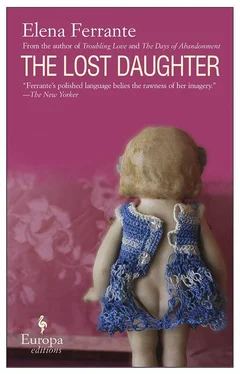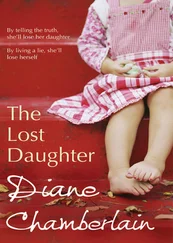I thought about what to do, finally decided. I took my purse, my shoes, wrapped a pareo around my waist, and went off toward the pinewood, leaving my books on the lounge chair, and hanging my dress on the spokes of the umbrella.
Gino had said that the Neapolitans were staying in a villa in the dunes, in the shelter of the pines. I followed the borderline between needles and sand, in shade, in sun. Soon I saw the villa, a garish two-story structure set among reeds, oleanders, and eucalyptus. The cicadas at that hour were deafening.
I headed into the underbrush, looking for a path that would lead to the house. Meanwhile I took the flyer out of my purse, and called the cell-phone number that was indicated on it. I waited, hoping that Nina would answer. While the telephone rang in vain, I heard the querulous trill of a cell phone in the thick scrub, on my right, and then the voice of Nina, who was laughing: come on, that’s enough, stop it, let me answer.
I ended the call abruptly, and looked in the direction the voice was coming from. I saw Nina in a thin dress of a pale color, leaning against the trunk of a tree. Gino was kissing her. She seemed to accept the kiss, but with her eyes open, amused, alarmed, as she gently pushed away the hand that was seeking her breast.
I went swimming and then lay with my back in the sun, my face between my arms. From that position I could see the boy returning, descending the dunes with long strides, his head down. Back in his place, he tried to read but couldn’t, and stared at the sea for a long time. I felt the slight irritation of the evening before turning into hostility. He had seemed so polite, had kept me company for hours, appeared considerate, sensitive. He’d said he was afraid of the fierce reactions of the relatives, of Nina’s husband, had put me on my guard. And yet he couldn’t contain himself, exposing himself and her to who knows what risks. He tempted her, attracted her just when she was most fragile, crushed by the weight of her daughter. As I had discovered them, they could be discovered by anyone. I felt unhappy with them both.
Surprising them had caused me, I don’t know how to put it, distress. It was a confused emotion, adding the seen to the not seen, making me go hot and sweatily cold. Their kiss still burned, warmed my stomach, my mouth had a taste of warm saliva. It wasn’t an adult sensation but a childish one, I’d felt like a frightened child. Distant fantasies returned, false, invented images, as when in childhood I’d imagined that my mother secretly left the house, day and night, to meet her lovers, and felt in my body the joy that was hers. Now it seemed to me that an encrusted sediment that had been lying for decades in the pit of my stomach was stirring.
I left my lounge chair nervously, and hurried to gather up my things. I was wrong, I said to myself, Bianca and Marta’s departure hasn’t been good for me. It seemed so, but it’s not. How long has it been since I called, I must hear their voices. Losing your anchor, feeling yourself to be light is not an advantage, it’s cruel to yourself and to others. I have to find a way to tell Nina. What’s the sense of a summer flirtation, as if you were a sixteen-year-old, while your daughter is sick. She had seemed so extraordinary to me, when she was with Elena, with the doll, under the umbrella, in the sun, or at the water’s edge. Often they took turns digging up wet sand with an ice-cream spoon and pretended to feed Nani. How well they got on together. Elena played for hours, alone or with her mother, and you could see that she was happy. It occurred to me that there was more erotic power in her relationship with the doll, there beside Nina, than in all the eros that she would feel as she grew up and grew older. I left the beach without looking even once in Gino’s direction, or Rosaria’s.
I drove home on the deserted road, my head full of images and voices. When I went back to my children—a long time ago now—the days became heavy again, sex a sporadic and therefore quiet practice, without expectations. Men, even before exchanging a kiss, made it clear to me, with polite conviction, that they had no intention of leaving their wives, or that they had the habits of a bachelor and wouldn’t give them up, or that they ruled out taking responsibility for my life and that of my daughters. I never complained; in fact it seemed to me predictable and therefore reasonable. I had decided that the season of passions was over, three years was enough.
Yet that morning when I stripped the bed where Brenda and her lover had slept, when I opened the windows to get rid of their odor, I had seemed to discover in my body a call for pleasure that had nothing to do with that of my early sexual experiences, at the age of sixteen, with the uncomfortable and unsatisfying sex with my future husband, with our conjugal habits before and especially after the birth of the children. After that encounter with Brenda and her man, new expectations arose. I felt for the first time, like a fist in my chest, that I needed something else, but I felt uneasy saying it to myself, it seemed to me that such thoughts were not appropriate for my situation, for the ambitions of a reasonable and educated woman.
Days passed, weeks, the traces of the two lovers faded for good. But I couldn’t settle down; instead, a kind of disorder took over my imagination. With my husband I was silent; I never tried to violate our sexual habits, not even the erotic slang we had elaborated over the years. But as I studied, did the shopping, stood in line to pay a bill, I would become lost in desires that embarrassed and at the same time excited me. I was ashamed of them, especially when they intervened while I was taking care of the children. I sang songs with them, read them fables before they fell asleep, helped Marta eat, washed them, dressed them, and meanwhile I felt unworthy, I couldn’t figure out how to calm myself.
One morning my professor called from the university and said that he had been invited to an international conference on E. M. Forster. He advised me to go, it was my subject, he thought it would be very useful for my work. What work, I wasn’t doing anything, nor had he done much to smooth the way for me. I thanked him. I didn’t have the money, I had nothing to wear, my husband was going through a rough period and was very busy. After days and days of anxiety and depression, I decided I wouldn’t go. But the professor seemed displeased. He said I was wasting myself. I got angry, and didn’t hear from him for a while. When I heard from him again, he told me that he had found money to pay for the trip and the hotel.
I had no more excuses. I organized every minute of the four days I would be gone: food ready in the refrigerator, visits from girlfriends happy to do all they could for a slightly mad scientist, a depressed student ready to babysit the children if their father had unexpected meetings. I departed, leaving everything in scrupulous order, except that Marta had a slight cold.
The plane to London was full of well known young academics, my rivals, who in general had been much more aggressive and active than I in the race to find a job. The professor who had invited me was reserved, brooding, a gruff man. He had two grown children, a kind and gracious wife, a lot of teaching experience, was highly cultured; yet he was seized by panic attacks when he had to speak in public. During the flight all he did was revise his paper, and as soon as we were in the hotel he asked me to read it to see if it was persuasive. I read it, said it was wonderful, soothed him—that was my function. He hurried off and I didn’t see him for the whole first morning. He appeared only in the late afternoon, just in time to give his paper. He read the text smoothly, in English, but when there was some criticism, he was distressed, responded brusquely, and went off to his room; he didn’t even come down for dinner. I sat at a table with other participants like me, hardly saying a word.
Читать дальше












